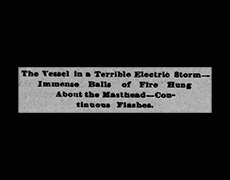
Strange lights, Saint Elmo’s fire, and other events happened during a hurricane while Captain Watson was out at sea.
A fascinating retelling by the Captain himself.
Vast Sheet of Flame
It was a story-teller’s day at the Maritime exchange, according to the New York Sun. A group of storm-bound ship captains gathered there all day. Stories about the weather were at a premium. The members of the group changed constantly, as the captains came and went, some stopping for an hour or two, others for only a few minutes.

Among those who came in late in the afternoon was Captain Watson, of the British freight steamship Centurion, 3,000 tons.
Upon his arrival here Captain Watson had reported a singular electric storm through which his ship had passed on her last trip to the branch hydrographic office in the Maritime exchange. He was asked to give the details of his experience.
“In all the thirty years I have spent on the sea,” he said, “I never went through such a night as that of Sunday, December 25, when we were in latitude 52 degrees north and longitude 35 degrees west.
“We were eight days out from Tyne. The weather at first was clear and mild. On Saturday, December 24, the wind blew a hurricane. The barometer sunk to 27.50 inches. The aurora lighted up the whole northern sky. The seamen on deck noticed several balls of fire at the masthead and along the stays during the night. The hurricane, which had been blowing from the northwest, shifted to the southeast, stirring up a nasty cross see, which threw us on our beam ends several times.
“On Sunday morning the hurricane continued. The waves rolled as high as our mastheads. During the day the hurricane shifted from the southeast to the northwest. The heavy rain which had been falling changed to hail. The hailstones were almost as big as eggs. The cross sea was the worst I ever experienced.
“At about 6 p.m. began the most wonderful electrical display I have ever seen or heard of. The ship seemed to be in the center of a vast sheet of flame, which was as bright as sunlight.
“The appearance of the sea under the queer light was awe-inspiring. The heavy cross sea sent waves over us at intervals of a few minutes.
“When the waves broke they looked like liquid fire. The power of vision seemed magnified. As far as we could see, the immense waves appeared to be crested with flame. The exhibition sent shivers even through old sea dogs like myself.
“The effect of the heavy hail storm was magnificent. It seemed as though the air was filled with balls of fire. The light was bright enough to read by. It penetrated throughout the whole ship and even in the engine room the light was brilliant.
“The brilliancy varied from a bright white to an incandescent yellow. The light came in flashes, so close together as almost to seem continuous.
“This light kept up for about two hours. After 8 p.m. it gradually faded, and was all gone at midnight. By daylight the weather had moderated.
“Some of the men were badly frightened by the electrical disturbance. I don’t blame them. It was enough to shake the courage of the strongest man. It took several days for the bravest of us to get over our nervousness.
“No one on the ship sent any electric shock during the storm. The compasses wavered and behaved as they usually do under the influence of an electrical disturbance.
“The strain on the ship’s machinery was terrible, and several of the smaller parts of the engines were broken. No accidents serious enough to disable the engines altogether happened, however.
“We gave up the attempt to keep up our course on Sunday, and merely let the ship drive before the storm. We kept up enough steam, however, to give the vessel steerage way.
“The waves washed over the decks repeatedly. The covers of the lifeboats were washed away, and the port bulwarks smashed in. We were thankful to escape with no more serious damage.
“On the next night the men on deck reported several balls of the ordinary St. Elmo’s fire, and we saw these on several occasions afterward. The voyage, which we usually made in twelve days, was protracted to nineteen.”
Source: The great West. (St. Paul, Minn.), 07 April 1893.

